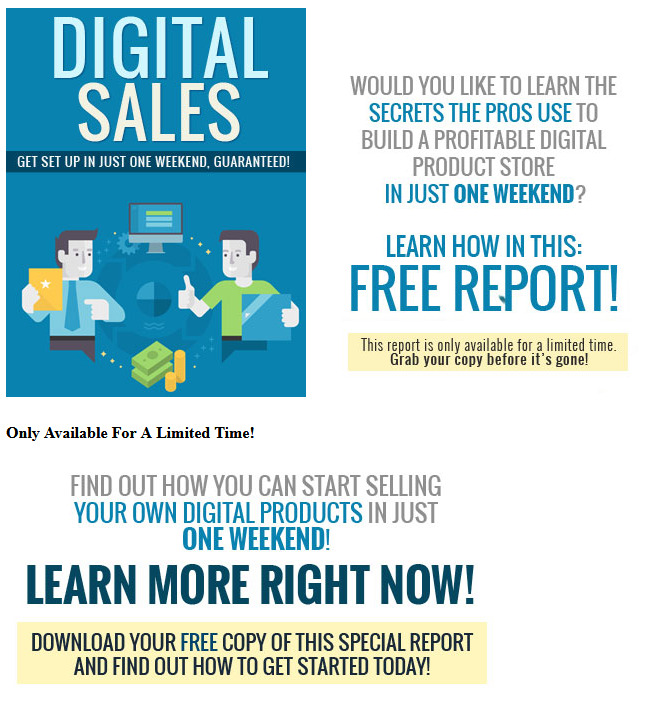Salespage Snapshot

Table of Contents
Introduction 4
Getting Started 6
Building Your Digital Store 11
Selling Products With Shopify 15
Selling Products With Amazon 20
Resources 26
Sample Content Preview
Getting Started
When planning your digital storefront, the first thing you’ll need to do is decide what kind of digital products you want to sell. That way, you can choose an ecommerce platform that does exactly what you need.
There are many different types of digital products to sell, such as books, software, graphics, videos and music, just to name a few. There are also just as many ways to sell that content, including paid access via a membership or subscription site where you can bill customers on a recurring basis, as well as selling individual digital products through a shopping cart system.
But, what if you just aren’t sure what type of digital content you intend to sell – or, you wish to expand your storefront in the future to include additional product formats?
For many of us, we start out selling individual products and later branch out to include collections, or additional auxiliary components that enhance the value of our front running product.
To do that, you’ll need a robust system that can manage upsells, one-time-offers, time sensitive offers and possibly give you the opportunity to rebill customers on a regular basis for ongoing access to your digital content.
If you aren’t sure what kind of products you intend to sell, or you want to choose a digital storefront solution that will allow you to sell any type of digital content imaginable, allowing you to branch out as your business grows, I highly recommend that you check out Product Dyno.
Product Dyno is a powerful, yet user-friendly system that allows you to sell an unlimited number of digital products either with your own domain or a sub-domain offered through their system.
What I like most about it Product Dyno that you can sell virtually any kind of digital product you can think of, including licenses to plugins, apps and software, and they make it exceptionally easy with a point and click interface that will guide you through the entire process.
It’s one of the easiest ways to get started, even if you’ve never done anything like this before, or you have limited time to dedicate to setting up your shop.
You can grab a copy of Product Dyno here: https://productdyno.com
Side Note: If you are anything like me and you want to prevent serial refunders from gaining access to your content only to turn around and dispute the charge, you can also use Product Dyno to immediately revoke access to your content. It’s simply one of the most robust, feature-rich solutions online.
If you want to build your own brand online, rather than simply point customers to a sub domain remotely hosted by your digital storefront provider, you’ll want to register a domain name. Even if you choose to let your digital market provider host your files, you can still point your domain to the sub-domain and build your own unique brand.
If you are looking for cheap domain name registrations from a company that’s been around for over a decade, check out www.NameCheap.com or www.GoDaddy.com
Cool Resource: If you want to check the availability of domain names on the fly, visit http://www.InstantDomainSearch.com and begin entering in keywords. The website will tell you whether a domain is available as you type in characters.
Once you have the domain, and you know what kind of digital products you intend to sell, you’ll want to decide whether you plan to host the website yourself, or use a service that remotely hosts your products for you.
This is referred to as “self-hosted” or “remotely hosted”.
Remotely hosted simply means that the provider will host your digital storefront for you, where with a self-hosted platform, you are setting up your own website and installing ecommerce software.
With a solution like Product Dyno, for example, you can create sub domains for all your digital product sales pages, or use your own website and Product Dyno can easily protect all your product pages.
If you choose to set up your own hosting account so that you can store files and build your website, I recommend Blue Host as they are not only incredibly affordable and offer fast and reliable servers, but they offer top-notch customer support.
Depending on whether you plan to store your own files, you’ll want to upgrade to a larger server, go dedicated, or you could create an account with a service like Amazon AWS that will host all of your files. You can take a look at their plans here: https://aws.amazon.com
Once you have a domain and hosting account, you’ll be able to start building your product pages and sell your digital products!
To recap:
1: Create a content plan that outlines the different types of digital products that you wish to sell.
2: Purchase a digital delivery and product protection system like www.ProductDyno.com, or an alternative solution.
3. Register a domain name or use an existing one.
4. Set up a hosting account with BlueHost, or another provider, so that you can begin building your product pages and sales copy.
Building Your Digital Store
If you want to set up shop quickly and easily, and you plan to host your own files and create your own website that features your digital product pages, I recommend installing WordPress. Not only will it be easier to create an attractive website (even if you lack design experience), but you can set up a fully-functional ecommerce website using powerful plugins that instantly add shopping cart functionality to your website.
Other Details- 2 Ebooks (PDF, DOC), 27 Pages
- 7 Part Autoresponder Email Messages (TXT)
- 1 Squeeze Page (HTML)
- Year Released/Circulated: 2017
- File Size: 2,131 KB
License Details:
[YES] Can be sold
[YES] Can be used for personal use
[YES] Can be packaged with other products
[YES] Can modify/change the sales letter
[YES] Can modify/change the main product
[YES] Can modify/change the graphics and ecover
[YES] Can be added into paid membership websites
[YES] Can put your name on the sales letter
[YES] Can be offered as a bonus
[YES] Can be used to build a list
[YES] Can print/publish offline
[YES] Can convey and sell Personal Use Rights
[YES] Can convey and sell Resale Rights
[YES] Can convey and sell Master Resale Rights
[NO] Can be given away for free
[NO] Can be added to free membership websites
[NO] Can convey and sell Private Label Rights













